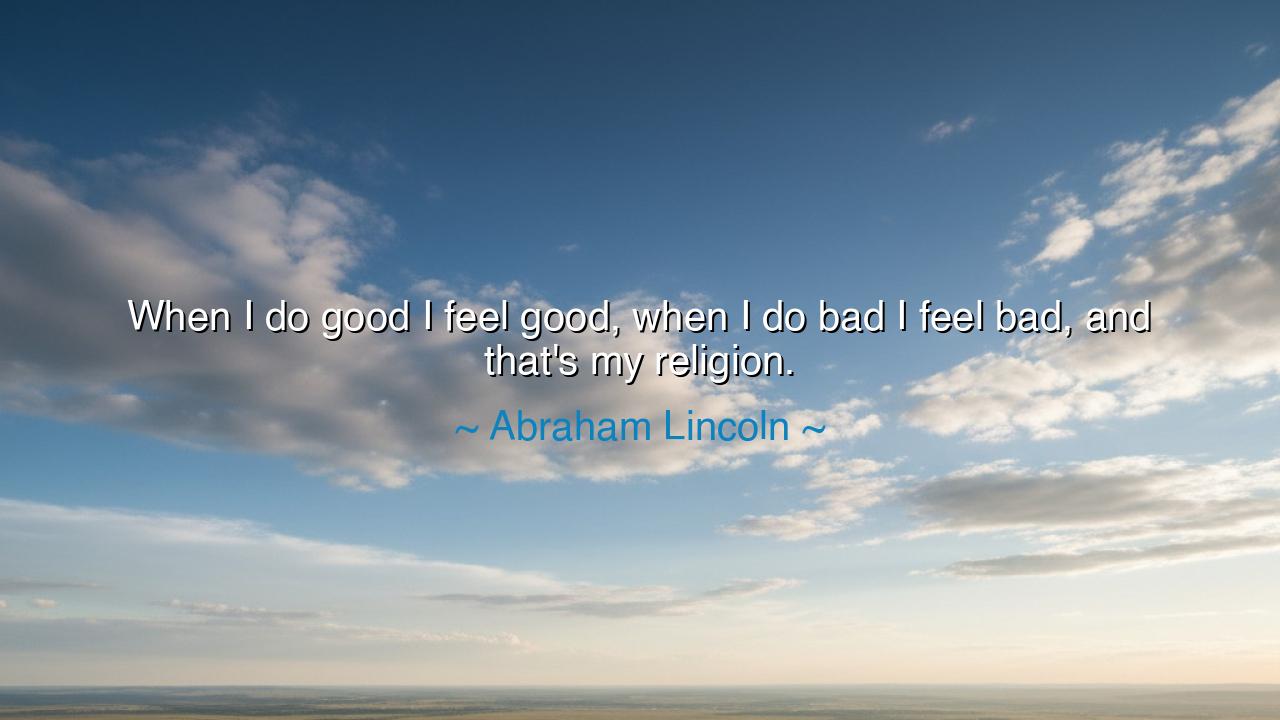
When I do good I feel good, when I do bad I feel bad, and that's






“When I do good I feel good, when I do bad I feel bad, and that's my religion.” — Thus spoke Abraham Lincoln, the humble titan of wisdom whose heart was as great as his deeds. In this simple and profound saying lies the essence of his moral compass, a faith not bound by dogma or ritual, but rooted in conscience, in the quiet knowing of the soul. Lincoln, who carried the weight of a divided nation upon his shoulders, understood that the truest religion is not found in words but in deeds — not in ceremony, but in character. For what greater act of faith is there than to live rightly, guided by the inner light of goodness rather than the approval of men?
These words reflect Lincoln’s deep spiritual independence, forged not in the safety of theology but in the fires of hardship and self-examination. Born on the frontier, far from temples or priests, his understanding of God came from the open sky, the toil of honest labor, and the cry of human suffering. He did not profess a particular creed, yet his life was steeped in moral reverence. “When I do good I feel good,” he said — and this was not sentiment but law, the unwritten covenant between man and his Creator. He believed that goodness, wherever it is found, is divine; and that to act justly is itself a form of worship.
Lincoln’s words were shaped by a time when America was torn in two, when the question of right and wrong was not abstract but bloody and immediate. As he walked through the dark valley of civil war, he often wrestled with doubt — doubt in men, in politics, even in himself. But through it all, he clung to the one truth he could never doubt: that the conscience is a sacred instrument, the voice of God within. It was this conviction that guided his hand when others faltered, that gave him the courage to sign the Emancipation Proclamation, freeing those long bound in chains. His religion was not about who worshipped where, but about who lived with compassion, honesty, and justice.
There is a story told of a night when Lincoln visited a battlefield after one of the war’s great tragedies. Surrounded by the wounded and dying, he wept silently, his head bowed not in despair, but in reverence. He did not ask what denomination each soldier belonged to, nor who had prayed in which manner. He saw only human beings, each sacred, each deserving of dignity. In that moment, his “religion” was clear: to do good where there was pain, to bring mercy where there was sorrow, to act justly even when the cost was great. His faith was not a creed of words, but a way of being — the religion of the heart.
In this sense, Lincoln stands beside the ancient sages and prophets. His belief mirrors the words of Micah: “What does the Lord require of you but to do justice, love mercy, and walk humbly with your God?” He understood that the heart of true faith is not found in ritual but in righteousness. The test of belief is not what one claims to know of God, but how one treats the least of His children. When Lincoln said, “When I do bad, I feel bad,” he was speaking of the natural law written in the soul — that every human being, if he listens, knows the difference between right and wrong. To ignore that law is to betray both oneself and the divine image within.
Yet this teaching is not merely for saints and statesmen; it is for every soul who seeks peace in a troubled world. When we measure our worth not by doctrines or divisions, but by the goodness of our deeds, we discover a universal faith — one that transcends culture and creed. Goodness is its own prayer, compassion its own temple. If we live by this inner compass, we will never stray far from the path of grace. For every act of kindness strengthens the heart, and every act of cruelty diminishes it. The soul, like the earth, bears the harvest of what it sows.
Therefore, dear listener, remember this: the truest religion is not professed but practiced. Do not ask what others believe — ask how they live. Let your goodness be your sermon and your integrity your offering. When you are tempted to do harm, remember that evil corrodes the spirit long before it wounds the world. And when you do good, feel the quiet joy that follows, for it is the whisper of heaven itself. As Lincoln taught, you need no temple but your conscience, no priest but your compassion, no scripture but your deeds.
For this is the enduring lesson of his wisdom: to live rightly is to live religiously, no matter what name one gives to God. Faith is not in the speaking but in the doing, not in the knowing but in the being. So live each day by the light of your conscience, and you will have found what Lincoln found — that peace of soul which neither wealth nor power can give, the peace of one who has done good and felt good, and in doing so has touched the eternal.






AAdministratorAdministrator
Welcome, honored guests. Please leave a comment, we will respond soon